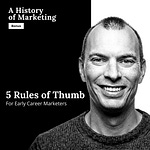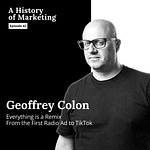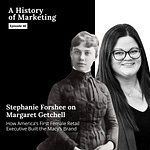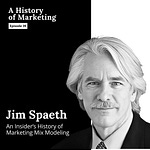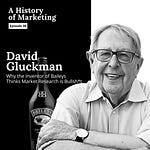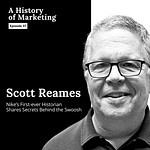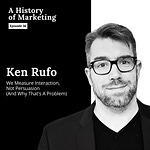Programming note: My wife and I are expecting our third daughter to be born any day now, so I expect to take the next couple weeks off from publishing podcast episodes. I aim to be back to our regular weekly publishing schedule as soon as possible. Thanks for understanding.
A History of Marketing / Episode 17
This week we're mixing up the usual format. I've been publishing this podcast for a few months now, so I thought this would be a good time to reflect on the conversations I've had so far, talk about what I've learned, and share a behind-the-scenes look at how the podcast is going.
Spoiler alert: I think it's going great.
I recruited my friend Scott Morris, Creative Director at Waka Seattle to interview me about the podcast.
Listen to the podcast: Spotify / Apple Podcasts / YouTube Podcasts
Scott is an incredibly talented documentary filmmaker who always asks thoughtful questions. He provided me with helpful advice and guidance as I put “A History of Marketing” together.
I gave Scott some of the top questions I've heard from listeners, but otherwise let him drive the conversation.
Now, here’s Scott Morris interviewing me.
The Origins of “A History of Marketing”
Scott Morris: I see this as serving as a proxy for your audience. So I'm going to ask you some questions about the podcast: how it started, how it's going, and then where it's going to go from here. So diving right in, let's go back to the beginning. A History of Marketing. Where did you get this idea? What's the origin story?
Andrew Mitrak: The podcast idea came all at once, but a lot of things were percolating in the background. I released a trailer, about a three-minute intro to the podcast, and it's a pretty honest trailer. It really tells my journey from the start, and of course, it's three minutes, so it's an abbreviated journey, but it tells most of the important parts of the story.
At some point, it hit me that I'm a marketer, and I've spent a dozen or more years doing this professionally, and I know very little about how it started. Meanwhile, I'm very interested in history. I read—most of the books I read are non-fiction or history books—and I feel like I have a grasp of a lot of other disciplines, the history of those disciplines. I know a little bit about psychology and economics and computer history and art history and music history, but I didn't know anything about marketing history. And that suddenly hit me as odd. And I'm like, I better go look for books on marketing history.
And I really didn't find any. There are some books, and I don't mean to diminish the work that's out there, but they tend to be very academic-oriented journal articles. There's a book called The History of Marketing Thought. Or they're siloed. They're histories of advertising, of certain elements of public relations, and biographies of individual marketers or advertisers or entrepreneurs. But there wasn't anything that was like a history of marketing. And similarly, there was no podcast dedicated to it either, or even a blog really dedicated to it. There were blog posts or podcast episodes that touched on marketing history, but nothing that really dived into this particular topic.
And being somebody who's interested in storytelling, interested in marketing, I thought this was a gap. And it was one of those moments where I thought, “This doesn't exist in the world, why don't I try to fill it?” And that's the start of the show.
Scott Morris: In the process of building up the interviews and starting the editing process and really building what you felt like was going to be this podcast, what's been the toughest part?
Andrew Mitrak: It's been surprisingly easy, all things considered. You are aware of this, most listeners probably are not, is that I have a video background. I had produced podcasts at a prior company that I was at. And so I know all the tools. I was a student in college, I was a journalist, I was a documentary filmmaker, and a lot of those skills translate pretty well to podcasting. I also am pretty good at cold emailing, and sending emails to guests was a fun little challenge. So a lot of that came easily. I'm not the best at any one of these things, but I think that I have a lot of the skills, when combined together, that make me pretty good at this so far.
I'd say the thing that I disliked the most about it—that to me it's hard because it's hard to do things when you're not having as much fun—is sometimes it's things that I've signed myself up for, like doing a YouTube short. I have a lot of joy in editing the full episode. I'm in the zone when I'm in Premiere and editing everything together, and I feel good about releasing the long-form stuff. But there are things that I'm like, well, every episode, every platform seems to want these short little snippets and these bite-sized things, and let me go ahead and do those as well. And I don't find as much joy in them. I see them as a little more of a chore.
So there are things like that that I'm like, it's my own doing. I could choose not to do it, but the things that don't get me excited about it, they feel the hardest to me. And also, I always edit the short last, so I've gotten the whole episode done, I've gotten it all transcribed, I've got everything published, and then I do this little short, and it seems like one extra thing to do. So maybe I'll stop doing that because it's really by my own choosing that I do it.
Surprising responses to the podcast
Scott Morris: Nice. Well, I have some ideas for that for you. So, let's talk about that afterward. You got to do those shorts, man. Once the episode started airing and you were starting to get feedback and listeners and subscribers, what was the thing that was most surprising to you? Was there anything that generally in terms of the folks who had been listening or specifically anyone that had reached out, left a comment or a post about one of the episodes?
Andrew Mitrak: The most surprising and delightful thing is the response from international marketers. And it helps you realize how big the world is, how interconnected we are, how the internet can help you reach anybody.
We're both here in Seattle, Washington, and I have a bias towards thinking about our local community or thinking about the United States or the English-speaking world. But when I look at the Substack subscribers, only like 29% are from the US. And the next biggest is Brazil and India and a lot of countries where English is not the dominant language there. But folks from all over the world will share a really nice note about how they are enjoying the show or share some LinkedIn post about this interesting conversation they found. And I search the show name and I come across and I'm like, "Oh wow, this person in Sweden liked it. That's so cool."
You see the numbers of how many hours cumulatively that have been listened to, and even though it's still a relatively small niche podcast, it does break your brain to think about, "Wow, a lot of people have actually heard this and reacted to it and reached out about it." So that's been super fun.
Scott Morris: How do you view engagement with that audience and how do you think about connecting with them? Is that something that's been on your mind?
Andrew Mitrak: Yeah, a theme for me personally, producing the show, is questioning whether I'm doing it for me or whether I'm doing it for listeners.
Selfishly, a lot of me reaching out to people is because of my own curiosity. It's because of my own interest in talking to some of the guests, doing things because I want to have a conversation or learn about a certain topic. And that's what makes the show fun to do is that it's not me trying to optimize for engagement or optimize for listenership or optimize for what some other audience wants. It's just me doing what I want to do, having the conversations I want to have, meeting the people that I want to meet.
But then people respond and they have feedback and they've dedicated their time to it. Everything has been super positive so far and everything's been very encouraging. So because I haven't really seen any negative feedback per se from listeners or things that would lead me to do anything differently than what I'm currently doing, I'm following my own interests for the most part. And whenever I receive a note or an email or anything, of course, I respond and am really grateful for it. It keeps me super motivated.
Starting with Philip Kotler
Scott Morris: When thinking about your own curiosity, right? And cold emailing. I know that reaching out to Philip Kotler was a pivotal moment in your decision in terms of whether to do this podcast or what it would look like. When you got that email back from him agreeing to the interview, what was that like?
Andrew Mitrak: Yeah, doing the podcast, I had this idea for A History of Marketing, but the question is, how does it become real? How do you actually do it? Because I've had a lot of ideas. I've probably shared a bunch of ideas with you of fun projects to do and documentaries to do or domains that I purchased and then never actually set up as a website.
And then this became real because when I was looking up which guest to talk to, Philip Kotler, who is sometimes called the father of modern marketing, he wrote my marketing management textbook that I used in grad school to learn about marketing. He is a legend. And I'm like, "Wow, he has to be one of the first guests."
So I purchased his autobiography. I think it's called My Adventures in Marketing, and read it. And the autobiography had his email address in there. And so I sent him an email. And since listeners have asked about this before—how did you get Philip Kotler?—I'm just going to read the exact email that I sent. And it's called "Podcast Interview: A History of Marketing" is the subject line. And I wrote:
I sent that to him at the start of November, and he responded within a day. You could tell there are things I said; I kind of made this podcast feel official as if I'd actually recorded one before. But it's a very transparent, truthful email. And I think partly the reason he probably agreed to do it, if I had to surmise, is that I clearly had done my research on him, read his book. If I was in his shoes and I'm looking at a podcast called A History of Marketing, why wouldn't I want to be a part of that, right? It's almost elevating marketing to a historical status.
So not only did he agree to do the interview, which was a huge win—that would have been gracious enough—he right afterwards emailed the people who would be my next several guests on the show: David Aaker, Jag Sheth, V. Kumar. And they then emailed folks who I should talk to as the next guest after that. And that really spurred a lot of the guest booking, especially for the first 12 episodes or so. Phil Kotler and his network really helped launch the show.
Scott Morris: Well, sticking to that email that's going to go down in history now, it's going to go in the PR museum. You chose a very specific amount of time for what you were asking for. I wonder if you could talk about why did you choose 45 minutes?
Andrew Mitrak: I always ask for 45 minutes because it tells somebody that is longer than a half hour, and usually if they agree to 45 minutes, they'll also agree to an hour. And also, it's not too big of a commitment. Also, I'm not Joe Rogan or whatever doing three or four-hour podcasts or something like that. I have a life, and so do the guests.
Marketing history is still being written
Scott Morris: We talked about some of the surprises that you found from audience members. What's something that's surprised you in terms of the content that you all have covered in these episodes?
Andrew Mitrak: Yeah, so I went in not knowing a whole lot about marketing history. There's this really silly throwaway joke from The Simpsons where Marge is thinking about how to make money and get a job or something like that. And she's like, "Oh, I'll be a piano teacher." And Lisa's like, "But Mom, you don't play piano." And Marge says, "I just have to stay one lesson ahead of the kid." And I kind of feel like Marge.
I know more than the average listener or even the average marketer. I've done some research, and especially now, I have really spent, I don't know, six months or so generally researching it. But I'm also not an expert. I'm not so deep in it that I'm doing really, really, really niche things. So all of that to say, I've learned a lot from the guests on the episode themselves.
The most surprising thing is that the history is not written in stone. There's relatively little of the historical record as it is, but even what exists is kind of debated over. I published that interview with Philip Kotler, and he talks about the early 1900s as the start of marketing.
And then I got some inbound from really smart professors who were like, "Phil Kotler, obviously smart, accomplished person, but I'm going to disagree with him there. Actually, I think it started earlier than that."
Or I think that the idea that marketing emerged as a field of economics, I'm going to dispute that and say it actually emerged much earlier, and there are things. I published this interview with Giana Eckhardt about how there were branding elements in Imperial-era China a thousand years before the 1900s. And Giana was one of those people who reached out to me where she had seen the Phil Kotler one. She's like, "Thanks for doing this. This is great. I want to add a unique perspective that hasn't been shared where I'm going to introduce some of my own research to this that'll kind of contradict some of what was shared before." And I think that's great. That's wonderful.
It also, this is part of why—we didn't talk about the naming of the show—but the name of the show is A History of Marketing, not The History of Marketing. I don't pretend to get everything right. I don't pretend to not have my own biases. I don't pretend to try to cover everything out there. And even the people who I interview, they might contradict each other or introduce new information. And I think that's a really exciting thing. So if you had asked me at the start, would I be talking about branding practices in Imperial-era China, I would have laughed at the idea that that was happening. So, all sorts of surprises across the board.
Selecting Marketing Legends and “Primary Sources” as Guests
Scott Morris: Speaking specifically about the guests that you've had so far, a lot of the folks that you've talked to have been more towards the end of their career or maybe even retired. And so it's created this opportunity for this great career retrospective that your interview ends up being for them. But I'm curious if you are thinking about interviewing folks more mid-career and what kind of more modern types of campaigns or other things are interesting for you as you look forward?
Andrew Mitrak: I think starting off, I thought, "Well, Phil Kotler, the father of modern marketing" Really sharp as you can hear the interview, but he is 93 years old. And he is somebody who may not have the capacity to do that forever. We're all mortal. And some of the guests are primary sources. Phil Kotler literally wrote the book, experienced a lot of this and a lot of change firsthand, was an active member in some of the changes in marketing, many of the changes in marketing. Same goes for Dave Aaker, Jag Sheth, V. Kumar, George Day—folks who had a big impact of lived lives. And I figured, prioritize them and start by going to the primary sources as much as I am able to, and then work my way forward.
Covering recent marketing history
Andrew Mitrak: And what's good about the podcast is that marketing history sounds like a niche, but where do you cut off the line of history? There's a lot to cover. I barely have really focused on the internet era, the first banner ads. There was this banner ad that I used to see all over—maybe it was on Netscape Navigator or something like that—of Punch the Monkey.
And it was this banner ad where there's this annoying little monkey that danced around, and you moved your cursor, and your cursor controlled a glove, and then you'd punch the monkey. And of course, the thing is, it wanted you to click on the banner. It didn't matter whether you actually hit the monkey or not.
And I'd like to meet the people behind these little ads that are really gimmicks, because there basically is this life cycle of an ad or a tactic where something gets launched, and then it works, and then people catch on, and maybe a bunch of other marketers and advertisers do it. And then so people see it everywhere, and then it stops working, and then you have to find something else.
There are so many little stories of the Punch the Monkey type ad or early viral ads, how much web has changed, e-commerce, the marketing funnel. There are all sorts of history that's really more recent history that I think will be fascinating to dive into. But to start, I wanted to go to some of the earlier generations and hear from the primary sources as much as I could.
Working Towards a “Marketing Mix” of Guest Voices
Scott Morris: Looking back at this first block of episodes, how do you feel about them now? What do you feel like is the story that you're kind of telling with this first block, and then where you kind of want to go?
Andrew Mitrak: You can hear in the Kotler email, I say I interview professors, authors, CMOs. And I think this first block especially was a little more biased towards professors. That's mostly who we've talked about so far. And while there were great authors—I was really, I really enjoyed the interview with Larry Tye about Edward Bernays. Really enjoyed Shelley Spector, the curator of this museum that also touched on PR. Mark Tungate, I thought that was a really fun one on covering advertising history through the ages.
Obviously Guy Kawasaki and Sergio Zyman who had great stories about Apple and their own careers and Coca-Cola.
So I'd like to get more of a mix. I feel like it's probably been 70-ish percent professors, and then the remainder being divided between authors and more practitioners. I'd like to develop a mix where I'm hearing from everybody because I'm really interested in seeing the intersection of where academic ideas meet the real world, how marketers can learn from academia and research that's being done, and on the flip side, how marketing theory can be enhanced by case studies that are from the real world or real-world marketing campaigns. That mix is something I'd like to keep developing.
Frankly, interviewing professors is a little easier because you know exactly what their research is, it's all published. Usually, professors have their email on their website, and so it's easier to get in touch with professors. But I want to be mindful and I don't want to over-anchor on academics, and I want to bring in more biographers and authors and historians and other marketing practitioners themselves.
Going back to me being selfish about it, I see them as me getting mentorship from these folks. I have so much to learn. And getting the excuse to sit down with somebody like Sergio Zyman, the first CMO of Coca-Cola, or Guy Kawasaki, somebody whose marketing books I've read and have influenced me, and hearing from them firsthand, it's so inspiring. I'm so grateful for it. It's one of the beneficial growth hacks of having a podcast is all these people get to talk to me. And I want to learn from more of them as well—professors as well, but also some of the marketing practitioners and authors out there.
Scott Morris: That's one thing that's really stuck out to me that you, a claim that you made in your trailer that turned out to be true, which is that a lot of these folks are really good storytellers. Guy Kawasaki and Larry Tye and Sergio Zyman, these are some really not great stories in a history of marketing, but great American or even broader stories that are being told. You guys have covered the 1984 Apple ad or New Coke or bacon as a breakfast food.
Future marketing campaigns to cover on the podcast
Scott Morris: For you personally, what are the kind of ad campaigns or marketing campaigns that you kind of have most been affected by or influenced by?
Andrew Mitrak: I don't know if I've been affected or influenced by it yet, but one campaign that I've become a really big fan of over this show and I want to keep exploring more is the Pepsi Challenge. I haven't booked this person yet. I'm trying to get him on, so if anybody listening happens to know him, his name is John Sculley. He's best known as being the CEO of Apple. He was played by Jeff Daniels in the Steve Jobs movie that Aaron Sorkin wrote. He has this incredible career, but before Apple, he spent a decade or more at Pepsi. And Pepsi was like 10% market share to Coke—a total underdog. It was like Coke was everything, and then it was Pepsi and the other guys. And then all of a sudden, Pepsi became pretty close to a 50-50 competitor, or maybe 40-60 or 45-55 to Coke. But in the 70s and then in the 80s, they were this juggernaut.
As a storyteller, I love the story of an underdog. As somebody who spent a lot of my career in a startup, you're always an underdog when you're a startup. And hearing how they took on the big guys who totally outspent them—they did the Pepsi Challenge.
And what is the Pepsi Challenge? It's kind of the truth. It's using a taste test, biasing the taste test to favor Pepsi, because if you take a sip of Pepsi versus a sip of Coke, you're more likely to prefer the sweeter of the two. It might be different if you drink a whole can or a whole pack, but they designed a test where it favors their product.
They filmed participants, almost like an early version of reality TV, reacting to it. They reported on the accurate results: most Americans or most consumers prefer Pepsi in a blind taste test to Coke. And they do that, they do the Pepsi generation, they do a bunch of underdog campaigns. They're not even mean-spirited at Coke; they're just like, "Hey, most people prefer Pepsi, time to give it a try."
And it has everything. It has, in classical rhetoric, ethos, pathos, and logos, right? Ethos is sort of, "Oh, I trust that because other people are doing it, or it's like some authority." And you see other people, most Americans, liking Pepsi. You see the pathos, the emotion of it. There's an ad where a grandma is like, "I've been drinking Coke my whole life. I guess I do like Pepsi more." And there's this emotional element to people realizing that they like it. And then there's the logic to it that most people prefer it. It's this ad that is new, it's an underdog, it works clearly for them. As somebody who's interested in how underdogs can use marketing to gain market share and to have that David versus Goliath type story, that's one campaign that I'm really interested in.
Scott Morris: I mean, as you're talking about it, I have very fuzzy memories of the Pepsi Challenge, but not nearly that solid memory that you have. So, yeah, it was fascinating.
Andrew Mitrak: One of the other things that sparked me in doing this podcast is I was referencing the Pepsi Challenge to a co-worker, and she had never heard of it. She had never heard of the Pepsi Challenge. And it did primarily run in the late 70s or the 70s and 80s, and I saw little elements of it in the 90s and maybe early 2000s. But I thought, "Wow, if marketers don't know about the Pepsi Challenge, we got to preserve this. We got to make marketers more aware of this. Marketing needs to be taught as a history just so you can learn about good ideas." So that was one of the other things among the things percolating that gave me the idea to pursue the podcast.
Applying Lessons of History to Marketing Today
Scott Morris: You are a marketer. You work as a Marketing Director for a large company. You've done this work for a long time.
Andrew Mitrak: [Laughs] I'm not a Director, you gave me a promotion. I was a director at startups…
Scott Morris: Soon to be marketing director. Has working on this and the interviews that you've done changed your view of marketing?
Andrew Mitrak: This is probably the most selfishly rewarding part is that speaking to these—many of them legends in marketing and people with great careers—is so inspiring, and it's absolutely changed how I work. There are a few ways how.
First, a big theme throughout the podcast is that marketing strategy, when implemented well, is not limited to the marketing department. Really, marketing as a function should be the interface between the company and the market that it serves. And it's a two-way job. You should be communicating the company to the market that you serve. You should also be analyzing the market and taking in market feedback, and then feeding that to the company to influence what the company does, how it builds its products, how it prices.
The first person that I spoke to was Philip Kotler, and Philip Kotler is famous for the 4Ps. He didn't invent the 4Ps, but he popularized them. And they're product, price, place, promotion. And it's something you learn about in a marketing textbook. And then what happens is you enter the marketing world, and you're basically just focused on one of those Ps, which is promotion. Right?
Maybe there are certain elements of place as far as if you call internet advertising or channel advertising or promoting on a certain channel. But marketing so often is lumped in with promotion, and the product and the pricing of it even today is often owned by a different team within a company. And I think marketing just can perform this strategic function where you have to think beyond promotion. You really have to think more holistically about what you can do. And I find myself stepping out of my lane as a marketer to try to advocate for other things the company should be doing or communicating upward on where the market I serve is at, things we can be doing, other trends are there. And I just see that as my job as a marketer to communicate upward and outward throughout the company.
The other one, at a more tactical level, is the interview with Robert Cialdini. I had read his book Influence way back when, and I read it again in advance of interviewing him a few months ago. And the way that he frames things, he has a language for stuff like the principle of reciprocity. Right? Now when I am running a campaign that means providing somebody an ebook about some services or something, I'm talking to my stakeholders about, "Hey, the reason we're doing this is the principle of reciprocity that when you give somebody something of value and you're not taking stuff from them, they like you more. They want to give something back. This is a sense of goodwill, and this is why you do these things. It's because of these psychological elements." I don't know if it works. I bet a lot of my colleagues just roll their eyes at me. But anyway, I'm using more and more of the language that these professionals use. I hope it makes me sound a little smarter...
Both in terms of the scope of marketing and some of the really tactical language I use around campaigns, it's totally influenced. And also, just publishing the podcast itself, a lot of what goes behind the scenes, I get to learn a lot of tools, AI tools even that I don't use in my everyday job. And so as a tactical person, I'm doing something that I don't do in my day job every day, and I'm getting to learn new tools and work new muscles. And I use my company's products a lot when I produce the product. So I get to empathize with users as well. So all those things, I think, accrue to influencing how I am as a marketer.
Scott Morris: That's so cool. And yeah, the episode with Robert Cialdini. I felt like if anyone hasn't listened to that, especially if you're a small business marketer or just marketing in general, it's like, yeah, I feel like I gave me a to-do list essentially is what I felt like, which was really exciting.
Andrew Mitrak: Yeah, if you are 30 minutes into this conversation with me and Scott right now, you should pause it. Go listen to the Robert Cialdini one.
Marketing and Measuring ROI
Scott Morris: You also talk a lot with a number of folks. I think particularly Guy Kawasaki with the 1984 ad and how that was, essentially, there was a lot of pushback about that ad, trepidation essentially about whether they should do it. And then also how effective was it in terms of ROI on the millions of dollars that they spent in producing it.
Now that you've gone through these interviews, how are you seeing that relationship between that kind of the art and commerce aspects of marketing and advertising?
Andrew Mitrak: I think that's an interesting one because that 1984 one, it's come up a lot, often cited as one of, if not the greatest ad of all time. And among the, not negative comments, but some LinkedIn reply guy is like, "Actually, this ad didn't work because the Mac was a failed product line." And it's funny how these things can still be debated to this day. And I think that's great. I think it's really cool that history is a living thing, it's being reassessed, re-evaluated. It's why a podcast like this, I think, has a lot of interesting material to cover.
Yeah, the relationship between art and commerce or another one for me is data and intuition. There's certainly a lot of the best marketers and campaigns seem to rely a lot on intuition. Somebody like Steve Jobs, I think he could be persuaded with data, but also clearly had a lot of intuition. Sergio Zyman and the Coca-Cola folks clearly used a lot of data, but they also did things with their intuition as well. I think that's an interesting idea too. The measurement and the ROI of marketing—marketing as an expense versus as an investment—on what time frame do you consider that investment? How important is measurability?
I think they're all really, really interesting questions, and I think it's good that there's not one single definitive answer to saying, "Oh yeah, the answer is 1.25” And that's it and it's settled and now we're going to… It's not that. It's something where, hey, it is a little squishier, and that's what makes it fun. That's what makes it exciting. That's what gives it a lot of rich history and stories behind it.
Favorite Moments from the Series (So Far…)
Scott Morris: I don't want to ask you what is your favorite episode, but I am curious if you have a favorite moment or a favorite insight that you've gleaned from these marketing legends that you've interviewed thus far. Do you have a favorite thing that you've done?
Andrew Mitrak: Yeah, I definitely wouldn't pick a favorite episode. A favorite moment was actually with the Sergio Zyman one where a lot of my episodes are very cheerful, happy, conversational. And I am not asking really super hard gotcha questions, and it's a very easygoing conversation that hopefully is insightful and well-researched but has positive vibes.
He's a little confrontational. He's a little jabby. That's his style. He likes to poke. He kind of was interrogating me about describing the taste of Coca-Cola.
Sergio Zyman Clip:
Sergio Zyman: Do you drink Coke? You drink Coke sometimes?
Scott Morris (from Zyman episode clip): Yeah, of course. I've had a Coke. I don't drink it every day.
Sergio Zyman: What does it taste like?
Andrew Mitrak: Well, first you feel the bubbliness of it, the sweetness to it, and then there's a bite.
Sergio Zyman: No, no, no. I didn't ask you how it feels. I ask you what does it taste like.
Andrew Mitrak: It's hard to say other than it tastes like Coke. It's hard to describe other than a Coke tastes like a Coke.
Sergio Zyman: Basically, a Coke has no taste memory.
Andrew Mitrak: Yeah.
Sergio Zyman: If you go and you say what does Pepsi taste like, people will say sweeter than Coke.
Andrew Mitrak: Coca-Cola is your baseline for comparing everything else.
Andrew Mitrak: He kind of put me on the spot and I'm like, "Gosh, I have to describe this to the guy who was the CMO of Coke." And he's kind of, he's like interrupting me. And I actually like that a lot. I think a lot of good podcasts have some tension to them, have some sense of drama, that there is a dynamic between the host and the guest and always respectful and everything, but also that there's a little bit of tension there. And I think that came up. So that strikes me as something that I'd like to explore more of. I want to have a really positive relationship with the guests, but I'm thinking about how do you inject more drama, more tension into the guests without, while it's still being an overall positive and informative experience?
Scott Morris: I did want to ask you actually, if you wanted to have another take of answering the question, what does Coke taste like? Now that you've had some time to think about it.
Andrew Mitrak: Last weekend I was thinking about this question, and I actually had a Coca-Cola for the first time in, honestly, probably like 10 years for me. I don't drink much soda in general. I've had some Diet Cokes here or there, but I hadn't had a Coca-Cola Classic in a long time. I'd kind of like to answer it exactly the same. It is mostly about the initial bubbliness. If you leave it in your mouth long enough, it gets very caramelized and sweet to it.
Scott Morris: [Interrupts] The taste, Andrew.
Andrew Mitrak: Here's the thing, if I was to push back on him, the thing about taste is taste is a sensation that really does encompass every other sensation. The sense of touch—people will describe themselves as a texture eater, right? And if something smells a certain way, that has a really big impact on how you actually taste it. If it looks a certain way, it'll actually really impact the taste. And I think he was being provocative there, but I would just push back on his idea that taste is only just what is the flavor in your mouth. It is—taste is actually a number of other things. And me describing the texture is a perfectly valid response to taste. So, if I was to defend myself, that's what I would say about it.
Wrapping Up and Listener Feedback
Scott Morris: Well, it made for a great moment. It really did. Well, thanks so much, Andrew. I mean, I've really enjoyed this conversation. I think it's been really fun and insightful to learn more about the behind-the-scenes of A History of Marketing and what's been motivating you and what have been some of your favorite moments. Is there anything else you want to hit on before we close out?
Andrew Mitrak: No, that was great. I'm laughing because you sound like me; you're clearly doing the same wrap-up thing that I always do. Any things you want to plug?
Scott Morris: The thing I was to ask you is, where can we find your work online? Is there anything that you'd like to plug?
Andrew Mitrak: No, this has been fun. Hopefully, it's been fun for listeners too. I think of a good podcast as having some education to it, some entertainment to it. Then there's also this idea of companionship to it, that there is, you form some relationship with the host. And I can tell it's happened with folks who have reached out to me and sent me nice notes. I'm hoping this does some of that, shows a little bit of what goes on, how I'm thinking about it. But also, I think the guests are the most interesting people. I just want to hear from them.
So listeners, if you've made it this far, hopefully you liked it okay. But also just let me know, shoot me a note: hello@marketinghistory.org. I read all the emails. I respond to them. You can find me on LinkedIn and shoot me a note there. I really like hearing from listeners. And if you like more things like this, let me know. With the caveat that, like I said at the beginning, I'm doing this selfishly to learn from the best—the CMOs, the authors, the professors, and the guests themselves—and I want them to be front and center of the shows.
Scott Morris: Do I get to promote anything or what?
Andrew Mitrak: [Laughs] Yeah, do you have any things you'd like to plug?
Scott Morris: People could to my website wakaseattle.com. I make videos for businesses like Pike Place Market, Bloodworks Northwest, and a lot of folks in the Pacific Northwest, but that's what I love doing. So if you want to go check it out there, you can also find me on LinkedIn.
Andrew Mitrak: I'll post a link to wakaseattle.com and your LinkedIn in the blog. And Scott, you're selling yourself short. Scott is an incredibly talented filmmaker, documentary maker, video producer, all-around great person to work with who does really great videos for great brands. So if you are in the Seattle area or beyond and are interested in working with a really talented video producer or somebody to guest host your podcast, he's good at that as well.
So with that, thanks so much, Scott. This has been a lot of fun.
Scott Morris: Thanks, Andrew. Take care.






